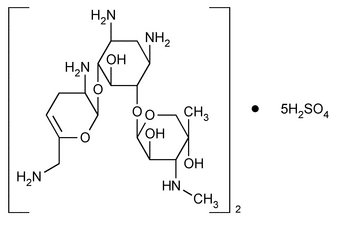Sisomicin Sulfate
(sis'' oh mye' sin sul' fate).
d-Streptamine, (2S-cis)-4-O-[3-amino-6-(aminomethyl)-3,4-dihydro-2H-pyran-2-yl]-2-deoxy-6-O-[3-deoxy-4-C-methyl-3-(methylamino)-
O-3-Deoxy-4-C-methyl-3-(methylamino)-
» Sisomicin Sulfate has a potency equivalent to not less than 580 µg of sisomicin (C19H37N5O7) per mg, calculated on the dried basis.
Sisomicin Sulfate has a potency equivalent to not less than 580 µg of sisomicin (C19H37N5O7) per mg, calculated on the dried basis.
Packaging and storage—
Preserve in tight containers.
USP Reference standards  11
11 —
—
USP Sisomicin Sulfate RS
Identification—
A:
Prepare a solution containing 10 mg of sisomicin per mL. Apply 5 µL of this solution, 5 µL of a solution of USP Sisomicin Sulfate RS containing 10 mg of sisomicin per mL, and 5 µL of a mixture of the two solutions (1:1) to a suitable thin-layer chromatographic plate (see Chromatography  621
621 ) coated with a 0.25-mm layer of chromatographic silica gel mixture. Allow the spots to dry, place the plate in a developing chamber fitted for continuous-flow thin-layer chromatography, and develop the chromatogram in a solvent system consisting of a mixture of methanol, ammonium hydroxide, and chloroform (60:30:25) for 3 hours. Remove the plate from the developing chamber, allow the solvent to evaporate, and heat the plate at 110
) coated with a 0.25-mm layer of chromatographic silica gel mixture. Allow the spots to dry, place the plate in a developing chamber fitted for continuous-flow thin-layer chromatography, and develop the chromatogram in a solvent system consisting of a mixture of methanol, ammonium hydroxide, and chloroform (60:30:25) for 3 hours. Remove the plate from the developing chamber, allow the solvent to evaporate, and heat the plate at 110 for 15 minutes. Spray the plate with a 1 in 100 solution of ninhydrin in butanol to which 1 mL of pyridine has been added: sisomicin appears as a brown spot, and the spots obtained from the test solution and from the mixture of test solution and Standard solution, respectively, correspond in distance from the origin to that of the spot from the Standard solution.
for 15 minutes. Spray the plate with a 1 in 100 solution of ninhydrin in butanol to which 1 mL of pyridine has been added: sisomicin appears as a brown spot, and the spots obtained from the test solution and from the mixture of test solution and Standard solution, respectively, correspond in distance from the origin to that of the spot from the Standard solution.
B:
It responds to the tests for Sulfate  191
191 .
.
pH  791
791 :
between 3.5 and 5.5, in a solution containing 40 mg of sisomicin per mL.
:
between 3.5 and 5.5, in a solution containing 40 mg of sisomicin per mL.
Loss on drying  731
731 —
Dry about 100 mg in vacuum at a pressure not exceeding 5 mm of mercury at 110
—
Dry about 100 mg in vacuum at a pressure not exceeding 5 mm of mercury at 110 for 3 hours: it loses not more than 15.0% of its weight.
for 3 hours: it loses not more than 15.0% of its weight.
Residue on ignition  281
281 :
not more than 1.0%, the charred residue being moistened with 2 mL of nitric acid and 5 drops of sulfuric acid.
:
not more than 1.0%, the charred residue being moistened with 2 mL of nitric acid and 5 drops of sulfuric acid.
Assay—
Proceed as directed under Antibiotics—Microbial Assays  81
81 .
.
Auxiliary Information—
Please check for your question in the FAQs before contacting USP.
| Topic/Question | Contact | Expert Committee |
|---|---|---|
| Monograph | Ahalya Wise, M.S.
Senior Scientific Liaison 1-301-816-8161 |
(SM12010) Monographs - Small Molecules 1 |
| Reference Standards | RS Technical Services 1-301-816-8129 rstech@usp.org |
USP35–NF30 Page 4642
